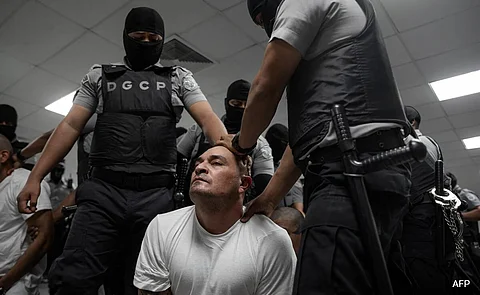
- NEWS
- the EDIT
- COMMENTARY
- BUSINESS
- LIFE
- SHOW
- ACTION
- GLOBAL GOALS
- SNAPS
- DYARYO TIRADA
- MORE

Venezuela announced a probe Monday into torture claims by 252 migrants the United States had sent to a notorious Salvadoran prison where they said they were beaten, sexually abused and fed rotten food.
Attorney General Tarek William Saab presented photos and testimonies at a news conference in Caracas of some of the men, who said they had feared not making it out alive.
Several had bruises on their bodies, marks of being shot with rubber bullets, and one had a split lip.
Andry Hernandez Romero, a 32-year-old beautician among those sent to the notorious CECOT prison as part of United States President Donald Trump’s migrant crackdown, said he barely survived the ordeal.
“We were going through torture, physical aggressions, psychological aggressions,” he said in a video presented by Saab.
“I was sexually abused.”
Saab said the prosecutor’s office was interviewing the returned migrants.
Many spoke of being held in “inhuman cells,” deprived of sunlight and ventilation, and given rotten food and unsafe drinking water.
The men had no access to lawyers or their relatives, and the last time many of them were seen was when President Nayib Bukele’s government issued photos of them arriving at the prison shackled and with their heads shorn.
By Monday afternoon, the migrants had not yet been reunited with their families.
Officials said they were undergoing medical exams, being issued with new Venezuelan ID cards, and interviewed by the prosecutor’s office.
Mercedes Yamarte, 46, told AFP she was preparing a welcome party for her 29-year-old son Mervin — one of the men released from the prison Bukele built as part of his mass anti-gang crackdown.
She had put up balloons, banners and prepared food at their home in a poor neighborhood of Maracaibo in northern Venezuela, but had no idea when to expect him.
At lunchtime on Monday, she received a call, and heard the words: “Mom, it’s Mervin.”
“I hadn’t heard my son’s voice in four months and seven days, listening to him was a joy, a joy I cannot describe,” she told AFP.
The men were accused in the United States of being gang members and flown in March to El Salvador, after Trump invoked rarely used wartime laws to deport the men without court hearings.
